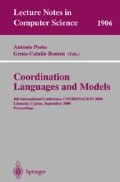Abstract
Hybrid specifications, i.e. ones containing both discrete and continuous changes, are used mainly in modelling systems that control some physical phenomena. In this paper, we propose hybrid modelling of novel wireless mobile systems, which generally fall under the term mobile computing. The particular systems consist of agents capable of moving in a physical reality and communicating wirelessly when in each other’s proximity. In this paper we concentrate on agents not capable of controlling their own movement, e.g. the ones designed to be carried around. Their environment comprises of a user and the physical reality whose nature is continuous rather than discrete. An approach to modelling of such systems is presented. The approach, which is based on the DisCo method, takes into account the continuous nature of the environment. Joint actions and closed system modelling are used to coordinate multi-agent interactions at a high level of abstraction. An example is presented where the approach is illustrated by a specification modelling file transfer operation between two agents.
Access this chapter
Tax calculation will be finalised at checkout
Purchases are for personal use only
Preview
Unable to display preview. Download preview PDF.
References
The DisCo project WWW page. At URL http://disco.cs.tut.fi, 1999.
T. Aaltonen, M. Katara, and R. Pitkänen. Disco toolset-the new generation. FM-TOOLS 2000: The 4th Workshop on Tools for System Design and Verification, July 2000.
M. Abadi and L. Lamport. An old-fashioned recipe for real time. ACM Transactions on Programming Languages and Systems, 16(5):1543–1571, Sept. 1994.
R. J. R. Back and R. Kurki-Suonio. Distributed cooperation with action systems. ACM Transactions on Programming Languages and Systems, 10(4):513–554, Oct. 1988.
R. J. R. Back and R. Kurki-Suonio. Decentralization of process nets with centralized control. Distributed Computing, 3:73–87, 1989.
K. M. Chandy and J. Misra. Parallel Program Design, A Foundation. Addison-Wesley, 1988.
E. W. Dijkstra and C. S. Scholten. Termination detection for diffusing computations. Information Processing Letters, 11(1):1–4, Aug. 1980.
H.-M. Järvinen, R. Kurki-Suonio, M. Sakkinen, and K. Systä. Object-oriented specification of reactive systems. In Proceedings of the 12th International Conference on Software Engineering, pages 63–71. IEEE Computer Society Press, 1990.
R. Kurki-Suonio. Hybrid models with fairness and distributed clocks. In Hybrid Systems, number 736 in Lecture Notes in Computer Science, pages 103–120. Springer-Verlag, 1993.
R. Kurki-Suonio and M. Katara. Logical layers in specifications with distributed objects and real time. Computer Systems Science & Engineering, 14(4):217–226, July 1999.
R. Kurki-Suonio and T. Mikkonen. Liberating object-oriented modeling from programming-level abstractions. In J. Bosch and S. Mitchell, editors, Object-Oriented Technology, ECOOP’97 Workshop Reader, number 1357 in Lecture Notes in Computer Science, pages 195–199. Springer-Verlag, 1998.
R. Kurki-Suonio and T. Mikkonen. Harnessing the power of interaction. In H. Jaakkola, H. Kangassalo, and E. Kawaguchi, editors, Information Modelling and Knowledge Bases X, pages 1–11. IOS Press, 1999.
L. Lamport. The temporal logic of actions. ACM Transactions on Programming Languages and Systems, 16(3):872–923, May 1994.
P. J. McCann and G.-C. Roman. Modeling mobile IP in mobile UNITY. ACM Transactions on Software Engineering and Methodology, 8(2):115–146, Apr. 1999.
L. Petre and K. Sere. Coordination Among Mobile Objects. In P. Ciancarini and A. Wolf, editors, Coordination Languages and Models, Third International Conference, COORDINATION’99, number 1594 in Lecture Notes in Computer Science, pages 227–242, Amsterdam, The Netherlands, Apr. 1999. Springer-Verlag.
G.-C. Roman, P. J. McCann, and J. Y. Plun. Mobile UNITY: Reasoning and specification in mobile computing. ACM Transactions on Software Engineering and Methodology, 6(3):250–282, July 1997.
Author information
Authors and Affiliations
Editor information
Editors and Affiliations
Rights and permissions
Copyright information
© 2000 Springer-Verlag Berlin Heidelberg
About this paper
Cite this paper
Katara, M. (2000). Hybrid Models for Mobile Computing. In: Porto, A., Roman, GC. (eds) Coordination Languages and Models. COORDINATION 2000. Lecture Notes in Computer Science, vol 1906. Springer, Berlin, Heidelberg. https://doi.org/10.1007/3-540-45263-X_14
Download citation
DOI: https://doi.org/10.1007/3-540-45263-X_14
Published:
Publisher Name: Springer, Berlin, Heidelberg
Print ISBN: 978-3-540-41020-1
Online ISBN: 978-3-540-45263-8
eBook Packages: Springer Book Archive

